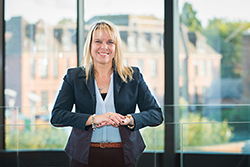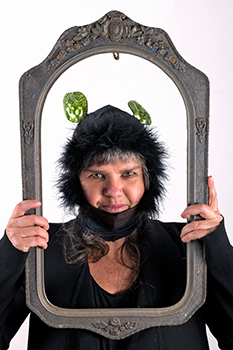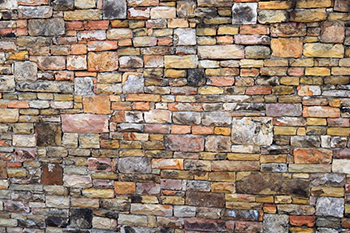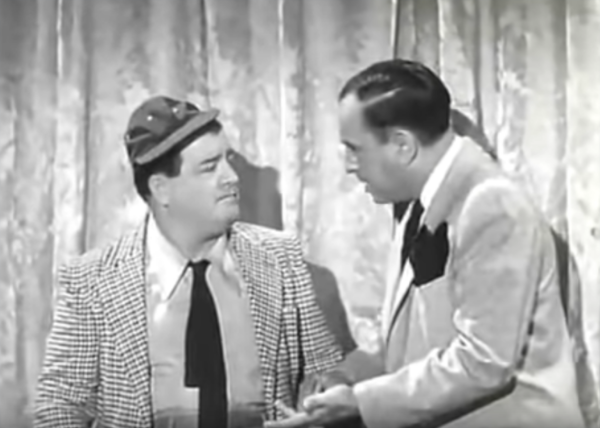
Timing is right for SCU’s new health head
While not quite a frying pan-to-fire situation, Julie Jomeen has had an ‘interesting’ twelve months, leaving the UK as the coronavirus was starting to bite and arriving in Australia when the university sector began facing its toughest challenges in years.
Things would not get easier at either end, with Boris Johnson’s government fumbling the COVID-19 response and Southern Cross University, to where Professor Jomeen was headed, about to axe 130 jobs amidst a devastating $33m budget shortfall. It wasn’t alone, and universities continue to wobble as overseas student income dries up.
Welcome to your new life…
“Yes,” Prof Jomeen confirmed in a Zoom call from the Gold Coast, near to the SCU campus that has seen significant growth in the last few years, “this was certainly the strangest start to a new job.”
- Details
- Written by: Robin Osborne

Goori Country - Of circuses, sideshows and high-wire feats
A Dickensian Sideshow – exhibition by Karla Dickens, Lismore Regional Gallery (Nov 2020 - Feb 2021, touring to Orange Regional Gallery in Nov 2021)
Aboriginal people were familiar faces in the circuses and carnival shows that toured Australian in the 20th century, crucial to the set-up and take-down work, the operating of sideshow alleys and the boxing tents run by the legendary Jimmy ‘Who’ll take a glove?’ Sharman.
None, however, was more famous than Lismore-born Cornelius Sullivan, with an Irish father and part-Bundjalung mother, who went on to become one of the most famous circus performers in the world under the name ‘Con Colleano’. Posing as a Spaniard because being Aboriginal wasn’t saleable, he dressed like a matador and delighted audiences in Australian the USA and Europe for a high-wire balancing act that included full somersaults and removing his flowing cape in mid-air.
- Details
- Written by: Robin Osborne
Read more: Goori Country - Of circuses, sideshows and high-wire feats
Who's Where?
Abbott & Costello - Who's on First?
Many North Coast practices communicate electronically with each other. This is particularly useful for general practitioners sending referrals to specialists and for specialists, radiologists and hospitals sending reports back to the patient's general practitioner.
This form of communication is supported by private companies known as secure message delivery (SMD) providers. On the North Coast the SMDs Medical Objects and Healthlink are the most widely used.
Medical Objects

Medical Objects is the more commonly used by GPs and specialists to communicate with each other since it makes the process of sending letters and referrals relatively simple. The Medical Objects software installs a miniweb server at each surgery that gives information on the status of the letters the practice has sent and received. The sent letters can be in one of several states, namely "dropped, undelivered, processing, delivered but not yet imported and delivered and consumed". The last signifies that the message has successfully reached the intended destination. The others assist in troubleshooting communications that have gone astray.
- Details
- Written by: David Guest

Nordocs 2020, Year in Review
“All in all you’re just a
'nother brick in the wall.”
Pink Floyd, 1979
For many Australians the end of 2020 will engender a huge sigh of relief ... it was a bastard, but we’ve made it! As the reality of the COVID-19 pandemic became clear as Autumn began, our collective anxiety levels rose.
There was a great fear of the unknown as well as of possible serious infection and even death. Nations embarked upon real-time experiments on the best ways to control a pandemic where, unfortunately, no control groups existed.
There was uncertainty about how the disease was spread and what measures were effective in controlling it. There was soon recognition that the disease was far more lethal in the elderly than the young. Some countries decided to follow a herd immunity approach to the pandemic. Many considered such an approach was not only unethical but cynical, and it was not widely adopted. After all, the elderly vote.
- Details
- Written by: David Guest, Medical Editor

Mental health inquiry calls for a sectoral ‘refocus’
There were few if any surprises contained in the Productivity Commission’s inquiry into mental health, with the near-final report delivered to the Australian Government in June made public near the end of 2020.
Some 63 pages into the 1273-page document the reader sees 21 key recommendations emerging from widespread community consultations and the deliberations of three eminently qualified commissioners, led by Professor Stephen King from Monash University.
- Create a person-centred mental health system? Tick.
- Support the social inclusion of people living with mental illness? Tick.
- Focus on children’s wellbeing across the education and health systems? Tick
- Support the mental health of tertiary students? Tick
- Take action to prevent suicide? Tick, tick, tick
- Details
- Written by: Robin Osborne
Read more: Mental health inquiry calls for a sectoral ‘refocus’
Page 42 of 177
















